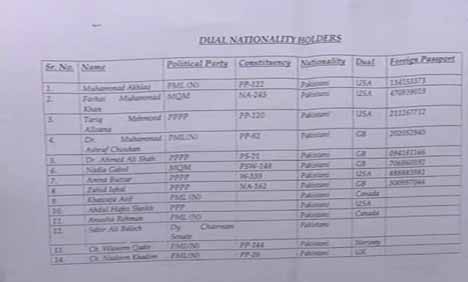It seems the first wave of petitions alleging parliamentarians holding dual citizenship was just a testing of the waters, and having found a friendly Court, the floodgates are beginning to open. Media reports that more than 14 more lawmakers have been targeted in a new petition to the Supreme Court, with even more expected soon. I have written about substantive questions that are raised by the substance of the petitions as well as the political questions that arise from using a law added under a brutal military dictatorship to disqualify democratically-elected officials. Today, however, I want to explore some procedural questions raised by these petitions.
The first question is, what is required to bring such a case? When petitioners approach the Court claiming that a member of parliament is ineligible due to holding dual citizenship, what do they have to show for the Court to take their claim seriously? Is the mere suggestion by a barrister using flowery legal language sufficient to attract the Court’s attention? In the words of Newsweek editor David Frum, “Can you really stand up in front of a Pakistani tribunal and spout whatever fool nonsense pops into your head?”
In the case of MNA Farahnaz Ispahani, the petitioner may have presented as evidence media reports that a US State Department list included an asterisk next to her name, suggesting she was a US national. But is one punctuation mark sufficient to bring a case, or was the petitioner required to show more evidence backing his claim?
The case of Interior Minister Rehman Malik is even more interesting. What evidence was presented that the Minister was a British national? Bloggers at Cafe Pyala say that Malik was seen using a red passport recently, but later updated the post noting that cabinet members actually carry red – not green – Pakistani passports. Was a case brought on a mistake? The real question, though, is whether some proof is required beyond what someone claims to have seen. If someone tells the Court that they saw Chief Minister Sindh change his form into a cat, is the CM obliged to prove he is not a jinn?
That the Interior Minister did have British nationality at one point is irrelevant to the procedural question raised above, but it actually raises another more troubling question. In the case of Farahnaz Ispahani, media reports alleging her dual nationality are well known. But in the case of Rehman Malik, I don’t remember any media reports claiming to have found public documents suggesting his British citizenship. In that case, how did the petitioner come to know about it? If the petitioner has documentary evidence that some or all of the accused parliamentarians are dual citizens, where did he get these documents? Is it possible for private citizens to check the nationality of other private citizens in foreign countries? Could someone, for example, ask the UK to confirm or deny if Imran Khan is now or ever has been a UK national?
On Monday, The News published an image of a document from the petition that appears to include foreign passport numbers for certain lawmakers.

How did the petitioner get these alleged passport numbers? Has the Court asked this question?
These questions have nothing to do with whether or not dual citizens should be allowed to hold office. These are questions related to fundamental rights of due process and justice. Surely bringing a petition against anyone – regardless of whether they are a member of parliament or a chai wallah – should require more than just “standing up in front of a Pakistani tribunal and spouting whatever fool nonsense pops into your head”, and if documentary evidence is provided, surely the Court should ask where the documents came from. While the media is buzzing about whether or not this or that MNA has dual citizenship, the real question that should be asked is where this story came from in the first place.
![]()

“According to legal experts, who spoke to The Express Tribune, the one event that could, in particular, be considered treasonous by the part of foreign governments would be the lawmakers’ voting in favor of the April 12, 2012, resolution that was unanimously passed by a joint session of parliament. The relatively strong-worded resolution demanded that the US tender an apology for Salalah incident, stop drone attacks and called for a ban on supply of arms to Afghanistan through Pakistan.”
These legal experts must be like Pakistani scientists and their supporters who were powering autos with water not too long ago. Everyday many US and other western citizens openly criticize their Govt policies and not a single of them have lost their citizenship or assets. I would like to know what the practicing lawyers from the US and Europe say about this news. It is ironic that people who have no concept of the sanctity of their own constitution (including the PCO SC) are the expert on foreign laws.
Comments are closed.